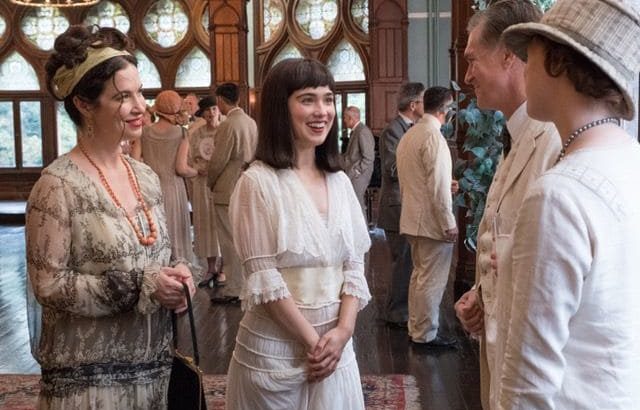The Chaperone, directed by Michael Engler, was a movie, though flawed in some areas, that was full of delightful details. It tells the story of sixteen-year-old Louise Brooks (played by Haley Lu Richardson, the future film star of the 1920s), and how she travelled from Wichita, Kansas to New York City to study dance at the Denishawn School. There was just one problem: Louise’s father would not allow her to go unless she was accompanied by a chaperone. Luckily for her, Norma Carlisle (played by Elizabeth McGovern) volunteers herself on a whim after seeing Louise, and the two head off to the big city – a stark contrast from small-town Wichita.
Though Louise Brooks is the “star” of the movie in that she is the larger-than-life character, Norma Carlisle is really the person that comes to be the main character. Layer by layer, we learn more about Norma’s past, and the movie deals with difficult themes of identity. Adopted from a New York orphanage by a farming couple in Kansas, Norma married her husband at age sixteen. As the audience, we can sense that Norma isn’t fully happy in her marriage, and Louise sees right through this as well, despite Norma’s insistence that she is perfectly happy. As it turns out, in a flashback scene, we learn that Norma’s husband is in a relationship with a man named Raymond. This is very complicated for the two of them, because they can’t separate under these circumstances, and so they remain together. However, in New York, Norma meets a man named Joseph, and the two of them connect in a way that she has never felt with Mr. Carlisle.
I will say that I found the character development between Norma and Joseph to be somewhat inconsistent. I was never entirely sure whether we were supposed to be seeing a newer, different side of Norma, or if her actions simply did not add up with her character. Particularly when they first met, Norma and Joseph’s interactions felt extremely awkward to me. They stood uncomfortably close to each other for people that were just meeting, and it did not seem like the Norma we knew from the other scenes. With Louise, she espoused moral and proper, lady-like behavior, and frowned upon flirting with boys (particularly a Columbia law student named Floyd), but her own actions with Joseph did not match this.
However, we did see Norma’s character arc develop throughout the movie, largely in part to Louise’s influences. She gains self-confidence, takes risks, and loses her corset. On a side note, having seen Elizabeth McGovern in the TV show Downton Abbey, it was interesting to see her play Norma, who had an entirely different affect.
The Chaperone was an enjoyable movie, but it won’t be added to my list of favorites.


